- Home
- Thomas Pynchon
Inherent Vice Page 5
Inherent Vice Read online
Page 5
“Well.
“Even before we got to San Diego, we were shooting up together in the back of somebody’s van, and less than two weeks later, on the interesting theory that two can score as cheaply as one, we got married, next thing we knew here came Amethyst, and pretty soon this is what we had her looking like.”
She handed Doc a couple of Polaroid baby pictures. He was startled at the baby’s appearance, swollen, red-faced, vacant. Having no idea of what kind of shape she was in at present, he felt his skin begin to ache with anxiety.
“Everybody we knew helpfully pointed out how the heroin was coming through in my breast milk, but who could afford to buy formula? My parents saw us locked into a dismal slavery, but Coy and I, all we saw was the freedom—from that endless middle-class cycle of choices that are no choices at all—a world of hassle reduced to the one simple issue of scoring. And how was shooting up any different from the old folks and their dinner-hour cocktails anyway? we figured.
“But actually when did it ever get that dramatic? Heroin in California? my gracious. Stepped on so often it should have ‘Welcome’ written across every bag. There we were happy and stupid as any drunk, giggling in and out bedroom windows, cruising straightworld neighborhoods picking out strange houses at random, asking to use the bathroom, going in and shooting up. ’Course, now that’s impossible to do, Charlie Manson and the gang have fucked that up for everybody. End of a certain kind of innocence, that thing about straightworld people that kept you from hating them totally, that real desire sometimes to help. No more of that, I guess. One more West Coast tradition down the toilet along with three percent product anymore.”
“And so . . . this thing that happened to your husband . . .”
“It wasn’t California smack, for sure. Coy wouldn’t’ve made that mistake, using the same amount without checking. Somebody had to’ve switched bags on him deliberately, knowing it would kill him.”
“Who was the dealer?”
“El Drano, up in Venice. Actually Leonard, but everybody uses the anagram because he does have that sort of caustic personality, plus his effect on the finances and emotions of those close to him. Coy had known him for years. He swore up and down it was local heroin, nothing out of the ordinary, but what does a dealer care? Overdoses are good for business, suddenly herds of junkies are showing up at the door, convinced if it killed somebody then it must be really good shit, and all they have to do themselves is be careful and not shoot quite so much.”
Doc became aware of a baby, or technically toddler, risen quietly from her nap, holding on to a doorjamb and watching them with a big expectant grin in which you could see some teeth already in.
“Hey,” Doc said, “you’re that Amethyst, ain’t you?”
“Yep,” replied Amethyst, as if about to add, “what’s it to you?”
Bright-eyed and ready to rock ’n’ roll, she bore little resemblance to the junkie baby in the Polaroids. Whatever dismal fate had been waiting to jump her must’ve had a short attention span and turned aside and gone after somebody else. “Nice to see you,” Doc said. “Really nice.”
“Really nice,” she said. “Mom? Want juice.”
“You know where it is, Juicegirl.” Amethyst nodded vigorously and headed out to the fridge. “Ask you something, Doc?”
“Long as it ain’t the capital of South Dakota, sure.”
“This mutual friend you and Coy have. Had. Is she, like, some kind of ex, or were you just dating, or . . . ?”
Who did Doc have to talk to about any of this that wasn’t stoned, jealous, or a cop? Amethyst had found a cup of juice waiting in the fridge and climbed up onto the couch next to him, looking all set for a grown-up to tell her a story. Hope poured more coffee. There was too much kindness in the room all of a sudden. Doc had learned only a thing or two in the business, but one of them was, kindness without a price tag came along only rarely, and when it did usually it was too precious to accept, being too easy, for Doc anyway, to abuse, which he was bound to. So he settled for, “Well, sort of an ex, but now she’s a client, too. I promised her I’d do something, and I waited too long, so the party she ended up with, scumbag developer and all, could be in some bad trouble now, and if I’d just taken care of business—”
“As one who’s been down that particular exit ramp,” Hope advised, “you can only cruise the boulevards of regret so far, and then you’ve got to get back up onto the freeway again.”
“Thing is, though, now Shasta’s disappeared too. And if she’s in trouble—”
Amethyst, realizing this wasn’t going to be her idea of entertainment, climbed down off the couch, threw Doc a reproachful look over her juice, and went off into the next room to watch the tube. Soon they could hear Mighty Mouse’s dramatic treble.
“If you’re on this other case,” Hope said, “busy with it or something, I understand. But the reason I wanted to talk to you,” and Doc saw it a half second before she said it, “is I don’t think Coy is really dead.”
Doc nodded, more to himself than to Hope. According to Sortilège, these were perilous times, astrologically speaking, for dopers—especially those of high-school age, who’d been born, most of them, under a ninety-degree aspect, the unluckiest angle possible, between Neptune, the dopers’ planet, and Uranus, the planet of rude surprises. Doc had known it to happen that those left behind would refuse to believe that people they loved or even only took the same classes with were really dead. They came up with all kinds of alternate stories so it wouldn’t have to be true. Some ex–old lady had hit town, and they’d run away together. The emergency room had mixed them up with somebody else, the way maternity wards switched babies around, and they were still on some intensive-care ward under another name. It was a particular kind of disconnected denial, and Doc figured he’d seen enough by now to recognize it. Whatever Hope was showing him here wasn’t it.
“Did you ID the body?” He figured he could ask.
“No. That was one peculiar thing. Whoever called said somebody from the band already did it.”
“I think it’s supposed to be next of kin. Who called you?”
She had her diary from that period, and she’d remembered to write it down. “Lieutenant Dubonnet.”
“Oh yeah, Pat Dubonnet, we’ve transacted one or two pieces of business.”
“Sounds like he ran you in.”
“Not to mention over.” She was giving him one of those looks. “Sure, I had this hippie phase. Everything I really did, I got away with, and nothin they picked me up on was ever my doing, because the only description they had was Caucasian male, long hair, beard, multicolored clothing, bare feet, so forth.”
“Just like the one of Coy they read me over the phone. It could’ve been a thousand people.”
“I’ll go talk to Pat. He might know something.”
“There’s this other thing that happened. Look.” She brought out an old bank statement from shortly after Coy’s alleged overdose, for her account at the local Bank of America, and pointed to a credit.
“Interesting sum.”
“I called, I went in and talked to vice presidents, and everybody insisted it was correct. ‘Maybe you lost the deposit slip, did the math wrong.’ Ordinarily don’t look a gift horse, you know, but this was creepy. They kept using exactly the same phrases, over and over, I mean, talk about denial?”
“You think it was something to do with Coy?”
“It showed up so close to his . . . his disappearance. I thought, maybe somebody’s idea of a payoff? Local 47, some insurance policy I didn’t know about. I mean, you wouldn’t expect it to be anonymous, would you. But here’s this mute set of figures in a monthly statement and some obviously jive-ass story the bank came up with to explain it.”
Doc wrote the date of the deposit on a match cover and said, “Is there a picture of Coy you could spar
e?”
Was there. She pulled out a liquor-store box full of Polaroids—Coy sleeping, Coy with the baby, Coy cooking heroin, Coy tying off, Coy shooting up, Coy out under a shade tree pretending to cower away from a 454 Big Block Chev engine, Coy and Hope out on the beach, sitting in a pizza joint playing tug-of-war with the last slice, walking down Hollywood Boulevard just as the streetlight was coming on.
“Help yourself. I should’ve probably thrown ’em all away a long time ago. Detach, right? move on, hell, I’m always lecturing everybody else to. But Ammie likes them, likes it when we look through them, I’ll tell her a little about each one, and she should have something anyhow, when she gets older, to remind her. Don’t you think?”
“Me?” Doc remembered how Polaroids have no negatives and the life of the prints is limited. These, he noticed, were already beginning to shift color and fade. “Sure, sometimes I’d like to have one for every minute. Rent, like, a warehouse?”
She gave him one of those social-worker looks. “Well, that . . . might be a little . . . Are you seeing, like, a therapist?”
“She’s more of a deputy DA, I guess.”
“No, I meant . . .” She’d picked up a handful of photos and was pretending to arrange them in some meaningful way, the gin hand of her brief time with Coy. “Even if you don’t know what you’ve got,” she said slowly after a while, “act sometimes like you do. She’ll appreciate that, and even you’ll be better for it.”
Doc nodded and picked up the first picture to hand, a shot of Coy holding his tenor, maybe taken during a gig, the lighting inexpensive, out-of-focus elbows and shirtsleeves and guitar necks poking in at the edges. “Okay if I take this one?”
Without looking at it, Hope said, “Sure.”
Amethyst came running in, revved up. “Here I am,” she sang, “to save the day!”
LATER IN THE AFTERNOON Doc drifted up to the Tree Section to his Aunt Reet’s place, where he found his cousin Scott Oof out in the garage with his band. Scott had been playing with a local group known as the Corvairs, till half of them decided to join the northward migration of those years up to Humboldt, Vineland, and Del Norte. Scott, to whom redwoods were an alien species, and Elfmont, the drummer, decided to stay on at the beach and went around sticking up ads on different school bulletin boards till they’d assembled this new band, which they called Beer. Playing mostly covers in bar gigs around the area, Beer were now actually almost paying their rent month to month.
At the moment they were rehearsing, or today actually trying to learn the correct notes to, the theme from the TV western The Big Valley, which had recently gone into reruns. The shelves of the garage were lined with jars of purple pork rind, sure-fire bait for the depraved reservoir bass Aunt Reet went off periodically to Mexico after and came back with the trunk full of. Doc wasn’t sure, but in the dimness the stuff always appeared to be glowing.
Beer’s front man Huey was singing, while the rhythm guitar and bass filled in behind him,
“The . . . Big . . .
Valley!
[Guitar fill]
The
BIG Valley! [Same guitar fill]
just
How big, is it, well go, visit sometime . . .
Ride all night, till,
Dawn-and-what will
you find?
The Big Valley! Yes! Even more-of— the
Big Valley! no place to score in— the
Big Valley! big? that’s for sure, it’s— the
Big Val-ley!
“It’s like my roots,” Scott explained, “my mom hates the San Joaquin, but I don’t know, man, every time I go up there, gigs at the Chowchilla Kiwanis or whatever, there’s this strange feeling, like I used to live there. . . .”
“You did live there,” Doc pointed out.
“No, like in another life, man?”
Doc had considerately brought along a shirtpocket full of prerolled Panamanian, and soon everybody was wandering around drinking cans of supermarket soda and eating homemade peanut butter cookies.
“Anything on the rock ’n’ roll grapevine,” Doc inquired, “about a surf saxophone player named Coy Harlingen who used to play for the Boards?”
“OD’d, right?” said Lefty the bass player.
“Allegedly OD’d,” Scott said, “but there’s also been a strange rumor going around, is that he really survived? they brought him back in some Beverly Hills emergency room, but everybody kept it quiet, some say they paid him to go on pretending he’s dead, and he’s out there someplace right now walkin among us in disguise, like with different hair and so forth—”
“Why would anybody go to that much trouble?” Doc said.
“Yeah,” said Lefty, “not like he’s some hot-lookin singer every chick wants to ball, some kick-ass guitarist who’ll change the business forever, just another surf-band sax player, easy to replace.” So much for Coy. As for the Boards, they’d been making piles of money lately, living all together in a house up in Topanga Canyon, with the usual entourage—groupies, producers, in-laws, pilgrims who’d journeyed long and hard enough to be taken in as part of the household. The resurrected Coy Harlingen was darkly rumored to be one of these, though nobody recognized anyone there who might be him. Maybe some thought they did, but all was fuzzed, as if by the fog of dope.
Later, as Doc was getting in his car, Aunt Reet stuck her head out the bungalow office window and hollered at him.
“So you had to go talk to Mickey Wolfmann. Nice timing. What did I tell you, wise-ass? Was I right?”
“I forget,” Doc said.
THREE
THE COP WHO’D CALLED HOPE HARLINGEN WITH THE NEWS ABOUT Coy’s overdose, Pat Dubonnet, was now top kahuna at the Gordita Beach station. Doc located behind his ear a bent Kool, lit up, and considered aspects of the situation. Pat and Bigfoot had come up at around the same time, both having begun their careers in the South Bay, practically on Doc’s own stretch of beach, back in the era of the Surfer-Lowrider Wars. Pat had stayed, but Bigfoot, quickly picking up a rep for stick-assisted pacification solid enough to look to the folks downtown like an obvious draft choice, had moved on. Doc had been around long enough now to watch a few of these hotshots come and go, and to note that they always left behind them some residue of history. He also knew that Pat had more or less fucking hated Bigfoot for years.
“Time for a visit,” he decided, “to Hippiephobia Central.”
He drove past the Gordita Beach station house twice before he recognized it. The place had been radically transformed, courtesy of federal anti-drug money, from a pierside booking desk with a two-coil hot plate and a jar of instant coffee into a palatial cop’s paradise featuring locomotive-size espresso machines, its own mini-jail, a motor pool full of rolling weaponry that would otherwise be in Vietnam, and a kitchen with a crew of pastry chefs working around the clock.
After threading his way among a crew of trainees chirping around the place squirting mist at the dwarf palms, Wandering Jews, and dieffenbachias, Doc located Pat Dubonnet in his office, and reaching into his fringe shoulder bag, withdrew a foil-wrapped object about a foot long. “Here you go Pat, expressly for you.” Before he could blink, the detective had grabbed, unwrapped, and somehow ingested at least half of the lengthy wiener and bun within, which had also come with Everything On It.
“Hits the spot. Amazed I have any appetite. Who let you in, by the way?”
“Posed as a drug snitch, fools ’em every time, all ’em bright new faces, still naïve I guess.”
“Not enough to stay here any longer than they have to.” Even though Doc was watching carefully, somehow the rest of the hot dog had disappeared. “Look at this miserable place. It’s The Endless Bummer. Everybody else will move on, but guess who, for his sins, will remain stuck out here forever in Gordita, nothin but penny-ante
collars, kids under the pier dealing their moms’ downers, when I should be in West L.A. or Hollywood Division, at least.”
“Center of the cop universe for sure,” Doc nodding sympathetically, “but we can’t all be Bigfoot Bjornsen can we—ups I mean who’d want to be him anyway?” hoping this wasn’t pushing things, given Pat’s mental health, frail on the best of days.
“At this point,” Pat replied grimly, a quiver in his lower lip, “I’d settle for a life swap even with him, yes trade what I’ve got for what’s behind the door where Carol is standing you might say, even if it turns out to be a zonk—in Bigfoot’s bracket how bad of a deal could that be?”
“Weird, Pat, ’cause what I hear is, is he’s scuffling these days. You’d know better than me, o’ course.”
Pat squinted. “You’re awfully inquisitive today, Sportello. I would have noticed sooner if I wasn’t so upset with career issues which are no doubt beyond you. Is Bigfoot giving you problems again? Call the Internal Affairs Hot Line, it’s toll-free—800-BENTCOP.”
“Not that I’d ever file a complaint or nothin, Lieutenant, understand, but how desperate, man, blood out of a turnip, even the most wasted spare-change artist up on Hollywood Boulevard knows enough to pass me by anymore, but not that Bigfoot, oh no.”
You could see a struggle going on here in Pat’s mind, between two major cop reflexes—envy of another cop’s career versus hatred of hippies. Envy won out. “He didn’t actually quote you a sum?”
“He listed some expenses,” Doc started improvising, and saw Pat’s ears definitely change angle. “Personal, departmental. I told him I always thought he was better connected than that. He got philosophical. ‘People forget,’ is how he put it. ‘No matter what you may have done for them in the past, you can never count on them when you need them.’”

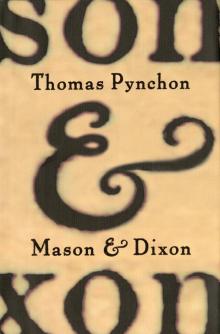 Mason & Dixon
Mason & Dixon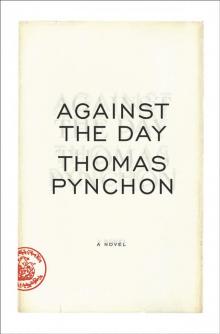 Against the Day
Against the Day Uncollected Works
Uncollected Works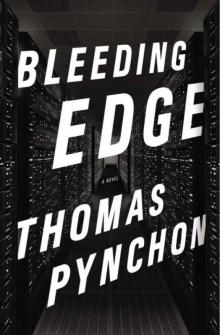 Bleeding Edge
Bleeding Edge Gravity's Rainbow
Gravity's Rainbow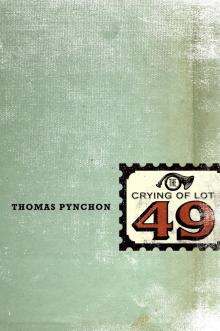 The Crying of Lot 49
The Crying of Lot 49 V.
V.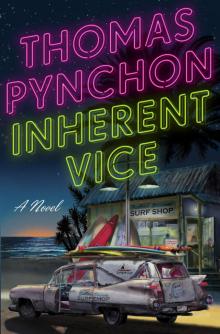 Inherent Vice
Inherent Vice Vineland
Vineland